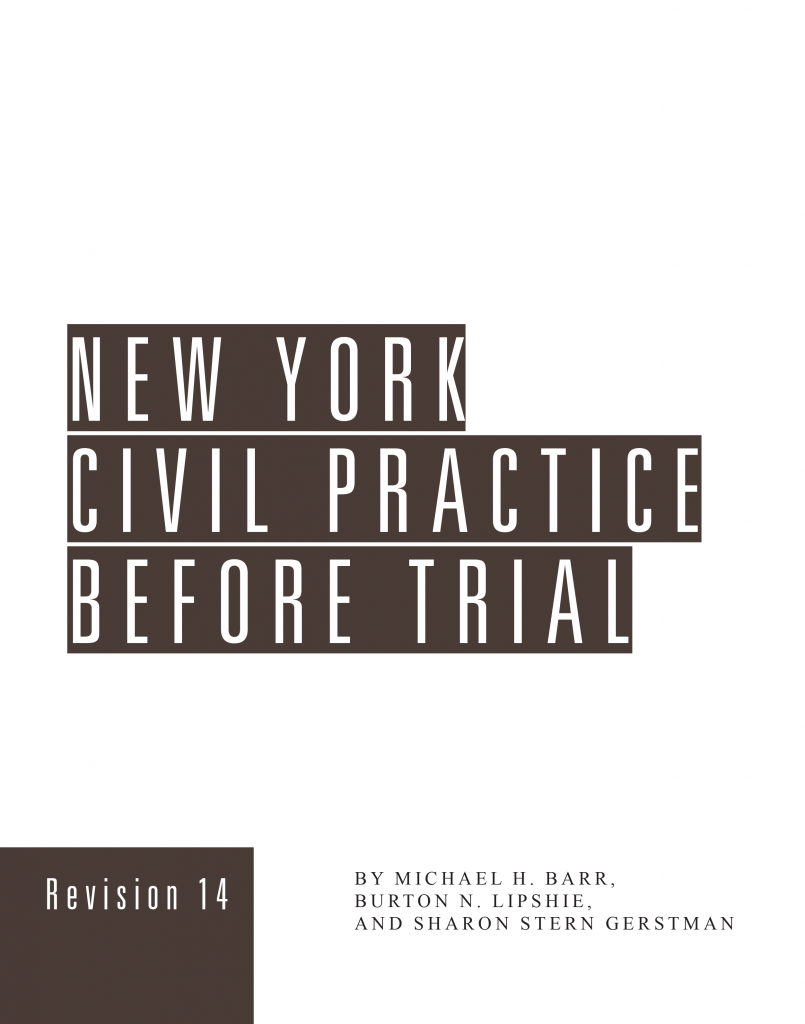New York Civil Practice Before Trial

Table of Contents
- Chapter 1 Taking the Case
- Chapter 2 Presuit Activities
- Chapter 3 Statutes of Limitations
- Chapters 4-5 Reserved
- Chapter 6 Subject Matter Jurisdiction
- Chapter 7 Personal Jurisdiction
- Chapter 8 Forum Selection: Venue and Removal
- Chapter 9 Summons, Service of Process, and Appearance
- Chapters 10-13 Reserved
- Chapter 14 Parties
- Chapter 15 Pleadings
- Chapter 16 Motion Practice
- Chapter 17 Temporary Restraining Orders and Preliminary Injunctions
- Chapter 18 Interlocutory Appeals
- Chapters 19-23 Reserved
- Chapter 24 All Discovery
- Chapter 25 Privileges
- Chapter 26 Production of Documents and Other Things
- Chapter 27 Depositions
- Chapter 28 Physical and Mental Examinations
- Chapter 29 Bills of Particulars and Interrogatories
- Chapter 30 Notices to Admit
- Chapter 31 Discovery Disputes
- Chapters 32-35 Reserved
- Chapter 36 Motions to Dismiss
- Chapter 37 Summary Judgment
- Chapter 38 Expedited Judgment: CPLR 3213; 3222
- Chapter 39 Default Judgment; Dismissal for Failure to Act; Discontinuance
- Chapter 40 Settlement and Alternative Dispute Resolution (ADR)
- Chapter 41 Simplified Procedure
- Chapter 42 Special Proceedings
- Tables
- Index
Highlights of this edition of New York Civil Practice Before Trial include:
• Six-year CPLR 213 statute governed interior designer’s contract as opposed to the four-year UCC 2-725 statute.
• The continuous representation doctrine applies to statutory limitations periods only and not to contractual limitations periods.
• Parties may by contract provide that representations and warranties are made “as of the Closing Date” rather than the earlier date of execution of the agreement.
• Courts disagree on whether registration by a foreign corporation constitutes consent to general jurisdiction.
• When a loan agreement contains the borrower’s consent to New York jurisdiction, but the accompanying guarantee does not contain such consent, the guarantor may be subject to New York jurisdiction.
• Residence for venue purposes cannot be demonstrated solely by evidence of ownership.
• When counsel appears for a defendant in default without challenging jurisdiction, the challenge is waived.
• First and Second Departments disagree on whether a defendant must demonstrate existence of a meritorious defense when applying to extend the time to appear, plead, or answer.
• Amended counterclaims must name the plaintiff even if the original counterclaim did so.
• A defendant amending an answer as of right may include a previously omitted limitations defense.
• Motion to amend or supplement pleadings must include a copy of the proposed amended or supplemental pleading.
• Courts may allow discovery of system metadata when relevant.
• Plaintiff’s failure to promptly object to specificity of expert disclosure can foreclose objection at trial.
• When attorneys consult in-house “counsel to the firm” about ethical obligations to firm client, their communications are not discoverable by the client.
• Court of Appeals holds that the common interest privilege applies only when subject matter of otherwise protected attorney-client communication is litigation, not transactional, advice
By Michael H. Barr, Burton N. Lipshie, and Sharon Stern Gerstman



